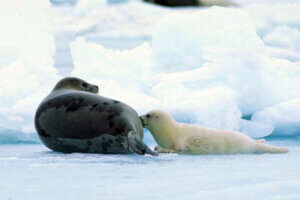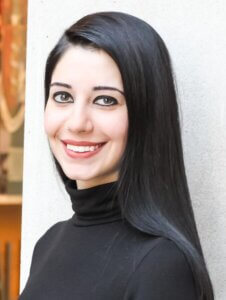The UCI’s Marine and Environmental Speaker Series resumed Jan. 26 with “A Tale of Two Seal Hunts: Contesting the Conflation of Canadian Sealing Activities.” The virtual lecture was delivered by Sarah Levy, a Ph.D. candidate at the University of Oxford (U.K.) Faculty of Law.
The discussion was moderated by Rechnitz Family/UCI Endowed Chair in Marine Environmental Law and Policy Randall Abate, who also serves as director of the Monmouth University Institute for Global Understanding. A Q&A session was held following the presentation.
Abstract
The Canadian commercial seal hunt that occurs annually in Atlantic Canada has attracted international criticism for decades primarily due to animal welfare and wildlife conservation concerns. Although the Atlantic sealing industry is an entirely separate and distinct activity from Inuit sealing occurring in Canada’s Arctic, the two practices are regarded by many as one and the same. The conflation of Inuit and commercial sealing has been a deliberate effort on the part of industry, government, and interest groups that have propagated a misinformation campaign on the subject.
 This presentation compares Inuit and commercial hunting activities, highlighting the differences between the purpose, practices, and scale of these hunts. With the distinctions between the two practices made clear, it explores the historic and ongoing ways in which the commercial sealing industry and federal government have perpetuated the conflation of the two. By failing to acknowledge the differences between Inuit and commercial sealing practices, special interest groups have been complicit in perpetuating this conflation as well, although several of these groups have recently worked to clarify the distinction between the two. As a result of the muddied dialogue on commercial and Inuit sealing, both food security and the survival of culture and livelihoods has been compromised in Inuit communities. Despite these ramifications, some Inuit support the commercial hunt because of how anti-sealing campaigns have adversely affected Inuit hunters. At the same time, other Inuit believe that the industry constitutes a wrongful appropriation of their sacred cultural practice, and are seeking to reclaim the practice as their uniquely protected right.
This presentation compares Inuit and commercial hunting activities, highlighting the differences between the purpose, practices, and scale of these hunts. With the distinctions between the two practices made clear, it explores the historic and ongoing ways in which the commercial sealing industry and federal government have perpetuated the conflation of the two. By failing to acknowledge the differences between Inuit and commercial sealing practices, special interest groups have been complicit in perpetuating this conflation as well, although several of these groups have recently worked to clarify the distinction between the two. As a result of the muddied dialogue on commercial and Inuit sealing, both food security and the survival of culture and livelihoods has been compromised in Inuit communities. Despite these ramifications, some Inuit support the commercial hunt because of how anti-sealing campaigns have adversely affected Inuit hunters. At the same time, other Inuit believe that the industry constitutes a wrongful appropriation of their sacred cultural practice, and are seeking to reclaim the practice as their uniquely protected right.
This presentation unpacks the distinctions between commercial and Inuit sealing practices, and explores the historic and ongoing implications of their conflation. It concludes that conflating Inuit and commercial sealing has been damaging for the harp seal species and Inuit communities alike.
Speaker Bio
 Sarah Levy is a Ph.D. candidate at the Faculty of Law, University of Oxford, where she is conducting research on the laws surrounding Canadian sealing activities. In her doctoral project, she is exploring the conflation of Inuit sealing practices and the commercial sealing industry, with a focus on the intersections of animal, environmental, and Indigenous rights in this context. Sarah has been called to the Bar of Ontario and held positions at the Ministry of Environment, Conservation and Parks at the Government of Ontario and Animal Justice Canada. She holds a B.A. (Hons) from Trinity College, University of Toronto in Ethics, Society, and Law and Environmental Studies, and a J.D. and Master of Environmental Studies from Osgoode Hall Law School at York University. She completed her master’s research on the topic of direct-action and international marine wildlife conservation laws, in which she explored the ways in which nongovernmental organizations fill the gap between law and enforcement where nation states fail to institutionalize conservation.
Sarah Levy is a Ph.D. candidate at the Faculty of Law, University of Oxford, where she is conducting research on the laws surrounding Canadian sealing activities. In her doctoral project, she is exploring the conflation of Inuit sealing practices and the commercial sealing industry, with a focus on the intersections of animal, environmental, and Indigenous rights in this context. Sarah has been called to the Bar of Ontario and held positions at the Ministry of Environment, Conservation and Parks at the Government of Ontario and Animal Justice Canada. She holds a B.A. (Hons) from Trinity College, University of Toronto in Ethics, Society, and Law and Environmental Studies, and a J.D. and Master of Environmental Studies from Osgoode Hall Law School at York University. She completed her master’s research on the topic of direct-action and international marine wildlife conservation laws, in which she explored the ways in which nongovernmental organizations fill the gap between law and enforcement where nation states fail to institutionalize conservation.
